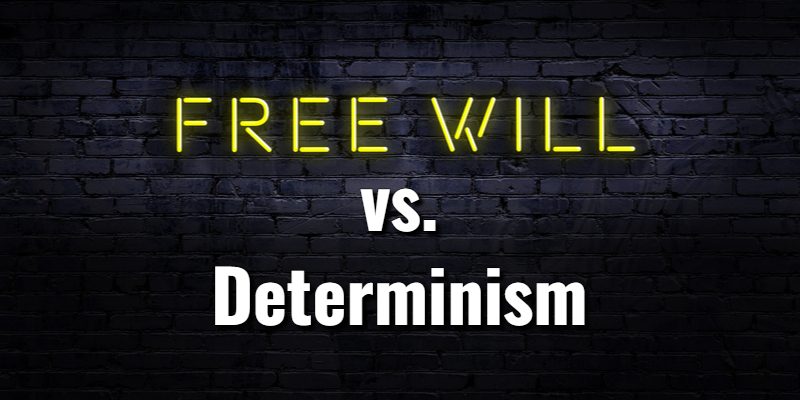Sr. Brigid, a Catholic nun and Medieval Studies professor I had in graduate school, shared this story: In high school English class, she and her classmates would purposely derail class lessons by asking their Catholic Priest teacher to answer the question: What is free will? Even as teens they knew the issue was sticky enough to mire down their teacher, who as expected, struggled in vain to define free will. The age-old debate free will vs. determinism is far from settled. In fact, Theologians and philosophers have been puzzling over the question for centuries, and faithful Christians still have differing doctrinal views on it. Those in the free-will camp believe that we have the ability to choose or choose otherwise. They argue that if free will doesn’t exist, we cannot be held morally responsible for our choices. They point to the many “if” statements in the Bible in which God sets conditions for rewards and punishments based on obedience to His will. They also mention passages like Matthew 23:37: “O Jerusalem, Jerusalem, thou that killest the prophets, and stonest them which are sent unto thee, how often would I have gathered thy children together, even as a hen gathereth her chickens under her wings, and ye would not!”
Determinists, on the other hand, believe that past circumstances causally determine present choices. Atheist determinists base their view on their naturalistic concept of creation (like evolution). Christian determinists often hold to the tenets of 16th century theologian John Calvin and are called Calvinists. Calvinists believe that God’s sovereignty is best respected by a deterministic world view. They buttress their belief with certain Bible passages, such as Exodus 4:21 and Roman 8:29-30.
Exodus 4:21: “And the Lord said unto Moses, When thou goest to return into Egypt, see that thou do all those wonders before Pharaoh, which I have put in thine hand: but I will harden his heart, that he shall not let the people go.”
Romans 8:29-30: “For whom he did foreknow, he also did predestinate to be conformed to the image of his Son, that he might be the firstborn among many brethren. Moreover whom he did predestinate, them he also called: and whom he called, them he also justified: and whom he justified, them he also glorified.”
Where do you stand? Maybe you’re not sure. It’s in this spirit that Lord’s Library editors decided to help you compare free will vs. determinism through four different web resources:
Free Will vs. Determinism: WebKey Resources to Consider
Molinism vs. Calvinism: William Lane Craig & Paul Helm on Unbelievable
In this debate, Christian philosopher William Lane Craig defends free will against leading Calvinist theologian and scholar Paul Helm. This debate is worthwhile for those who may not have a clear grasp of one or both stances. For many listeners, this episode will likely be an introduction to Molinism, a view first offered by 16th century counter reformer and Jesuit priest Luis Molina.
Craig believes Molinism best explains free will without discounting God’s sovereignty. Helm expounds on why he holds to a “soft” determinism, which he feels is essential for those who accept God’s complete sovereignty. For those who want to go a little more into the weeds, both men have web sites where they expound, in writing, on their beliefs (search for the topics as each has written more than once about it): Craig’s can be seen here while Helm’s blog is available here.
Debate: Dan Barker vs Braxton Hunter (Is Free Will an Illusion?) on Unbelievable
You may wonder why we have two debates about the same issue from the same podcast. Although the topic is the same, the debaters come from different perspectives. In this episode, apologetics professor and president of Trinity College of the Bible and Theological Seminary Braxton Hunter debates atheist Dan Barker, who co-leads the Freedom From Religion Foundation. Hunter defends the free will perspective while Barker argues for hard determinism. Barker believes free will is a “useful illusion.”
This episode made our list because it provides a nonbeliever’s perspective on determinism and demonstrates how a believer can defend the free will perspective.
What Is Free Will? Chosen by God Teaching Series by R.C. Sproul
The late R.C. Sproul was a brilliant Calvinist Theologian. This video (with accompanying transcript) is a detailed explanation of what Sproul sees as some problems with the concept of free will as most people think of it. He slices the issue thinly, examining the very notion of what it means to be “free.” One of Sproul’s many strengths is his use of analogies and examples–from the Bible and elsewhere–to explain points. His approach makes the issue accessible for the average person.
What is Compatibilism? by GotQuestions.org
Anyone who has thought about free will versus determinism has probably come across the term compatibilism. Compatibilism is the determinist’s way of reconciling free will with determinism. If you’re confused, you’re not alone. Fortunately, the thinkers of GotQuestions.org have put together an explanation to make it clearer.
Final Thought
Did you choose to read this article, or was it pre-determined that you would? Maybe after considering the above resources, you can more confidently answer that question.
NOW READ: The Moral Argument: Web Resources to Consider
Lord's Library participates in affiliate programs. We may make a small commission from products purchased through this resource.
- Intelligent Design vs. Evolution: Six Web Resources to Consider - October 3, 2023
- Microevolution vs. Macroevolution: Six Web Resources to Consider - September 9, 2023
- Atheist Objection to Theism #4: Presumption of Atheism Argument - August 21, 2023













